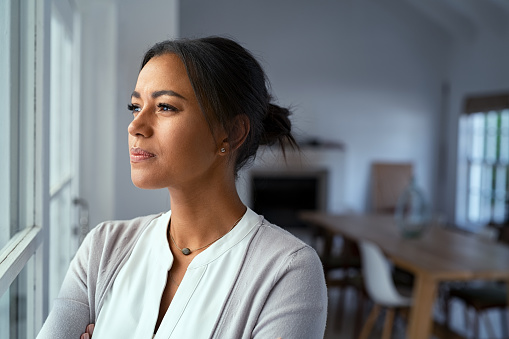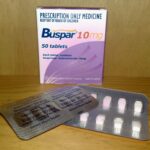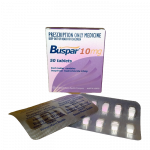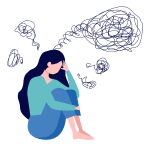Can Buspar Make Anxiety Worse?

Buspar (buspirone) is a medication that is commonly used to treat anxiety disorders. It was first introduced in the United States in 1986 and is classified as an anxiolytic medication.
Buspar was developed as an alternative to benzodiazepines, such as Xanax and Valium, which can be habit-forming and have the potential for abuse. Unlike benzodiazepines, Buspar is not a sedative and does not cause drowsiness. It works by binding to serotonin and dopamine receptors in the brain, which helps to reduce anxiety symptoms.
Buspar is typically used to treat generalized anxiety disorder (GAD), but it can also be used to treat other anxiety disorders, such as panic disorder and social anxiety disorder. It is often prescribed for people who have a history of substance abuse or who are at risk of developing an addiction to benzodiazepines.
Buspar is available in tablet form and is typically taken two or three times per day. It can take several weeks to achieve full effectiveness, and it is important to take it consistently as prescribed by a healthcare provider.
Buspar is generally well-tolerated and has a lower risk of side effects compared to benzodiazepines. Side effects can include dizziness, headaches, nausea, and nervousness. Rarely, Buspar can cause more serious side effects, such as seizures or an allergic reaction.
Overall, Buspar is an effective medication for managing anxiety symptoms, particularly for people who are at risk of developing addiction to benzodiazepines. It is important to talk to a healthcare provider before starting any new medication for anxiety, as they can help to determine the best treatment options based on individual needs and symptoms.
Can Buspar Make Anxiety Worse?
Yes, while Buspar is generally well-tolerated and effective in treating anxiety, some people may experience an increase in anxiety symptoms when taking the medication. There are several reasons why this may occur:
1. Dose: Buspar is typically prescribed at a lower dose than benzodiazepines, such as Xanax, and it can take several weeks to achieve full effectiveness. If the dose is too low, or if it is not taken consistently as prescribed, it may not effectively reduce anxiety symptoms.
2. Timing: Buspar is typically taken two or three times per day, and it is important to take it at the same time each day. If the timing of the medication is inconsistent, it may not be as effective in reducing anxiety symptoms.
3. Interaction with other medications: Buspar can interact with other medications, particularly those that affect the central nervous system. If Buspar is taken with other medications that affect the brain, it may exacerbate anxiety symptoms.
4. Underlying health conditions: Some people with underlying health conditions, such as depression or bipolar disorder, may experience an increase in anxiety symptoms when taking Buspar.
5. Individual response: Everyone’s body reacts differently to medications, and some people may simply have an adverse reaction to Buspar that leads to an increase in anxiety symptoms.
If Buspar is making anxiety symptoms worse, it is important to talk to a healthcare provider. They can help to determine the underlying cause of the increase in symptoms and adjust the medication or dosage as needed. It is also important to continue taking Buspar as prescribed until directed by a healthcare provider, as suddenly stopping the medication can cause withdrawal symptoms.
Alternatives to Buspar For Anxiety
Buspar is commonly used to treat anxiety disorders, but it is not the only option available. There are several alternative treatments that can be effective in managing anxiety symptoms. Here are some alternatives to Buspar for anxiety:
1. Therapy: Psychotherapy, or talk therapy, can be an effective treatment for anxiety. Cognitive-behavioral therapy (CBT) is a common type of therapy used to treat anxiety disorders. CBT helps individuals identify and change negative thought patterns and behaviors that contribute to anxiety symptoms.
2. Meditation and mindfulness: Mindfulness meditation is a practice that involves focusing on the present moment and becoming more aware of one’s thoughts and feelings. It can help to reduce anxiety symptoms and improve overall well-being.
3. Exercise: Regular exercise can help to reduce anxiety symptoms by reducing stress and improving mood. Exercise releases endorphins, which are natural mood boosters.
4. Yoga: Yoga is a mind-body practice that combines physical postures, breathing exercises, and meditation. It can help to reduce anxiety symptoms and improve overall well-being.
5. Dietary changes: Certain foods can contribute to anxiety symptoms, while others can help to reduce them. A balanced diet that is rich in whole grains, fruits, and vegetables can help to reduce anxiety symptoms.
6. Herbal remedies: Certain herbal remedies, such as chamomile, valerian root, and passionflower, have been shown to have calming effects and can help to reduce anxiety symptoms.
7. Other medications: There are several other medications that can be effective in treating anxiety. Selective serotonin reuptake inhibitors (SSRIs) and serotonin-norepinephrine reuptake inhibitors (SNRIs) are commonly used to treat anxiety disorders. Beta-blockers, which are typically used to treat high blood pressure, can also be effective in reducing anxiety symptoms.
It’s important to talk to a healthcare provider before starting any new treatment for anxiety. They can help to determine the best treatment options based on individual needs and symptoms. With the right treatment, it is possible to manage and reduce anxiety symptoms, allowing individuals to lead fulfilling and productive lives.





